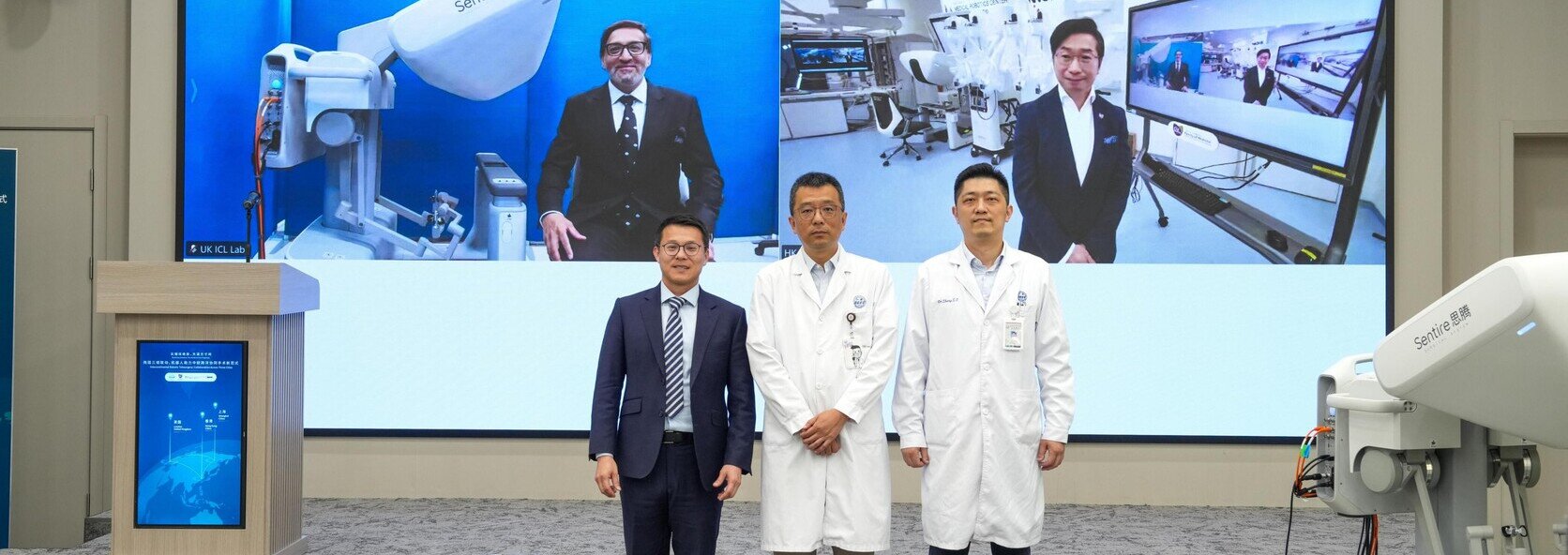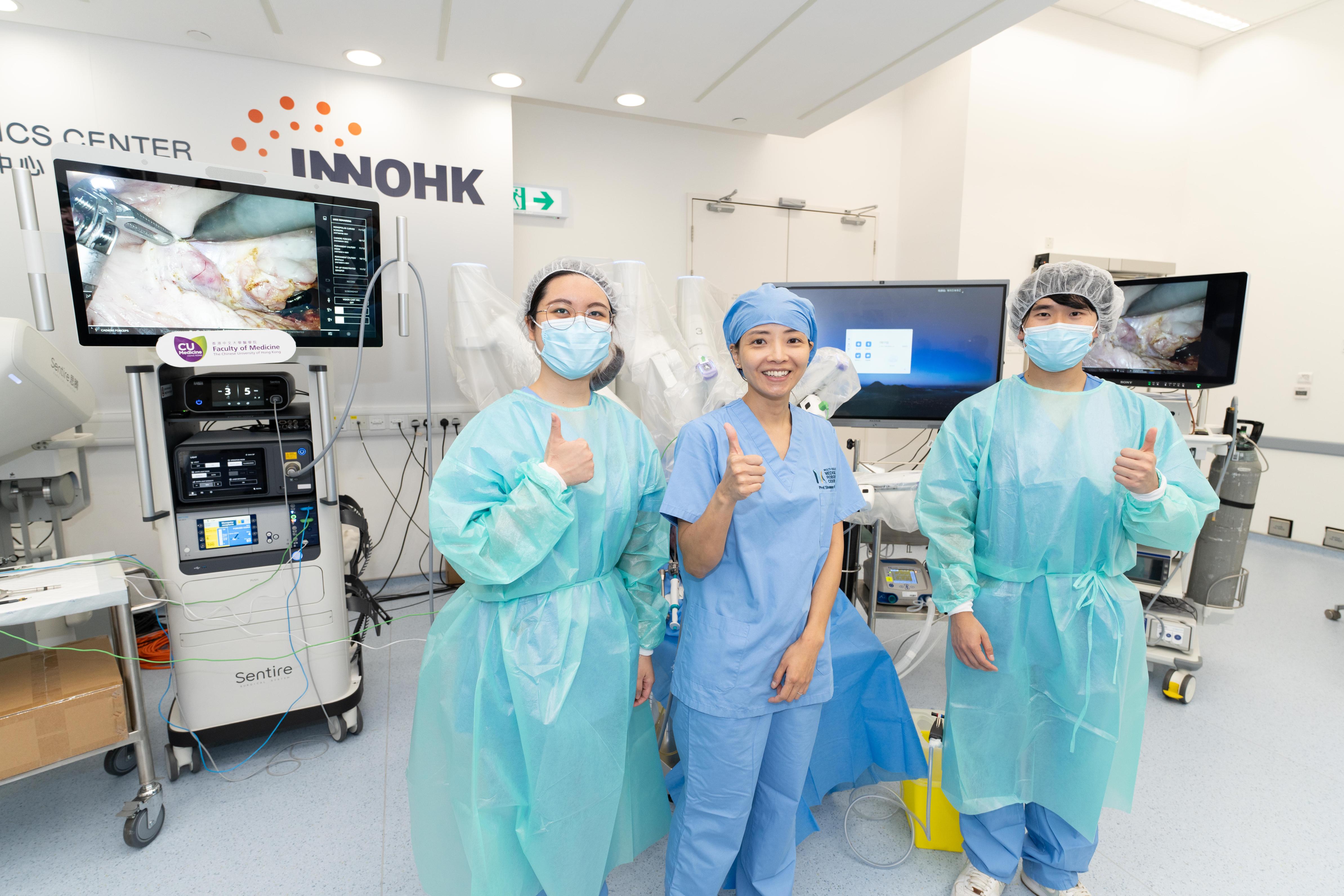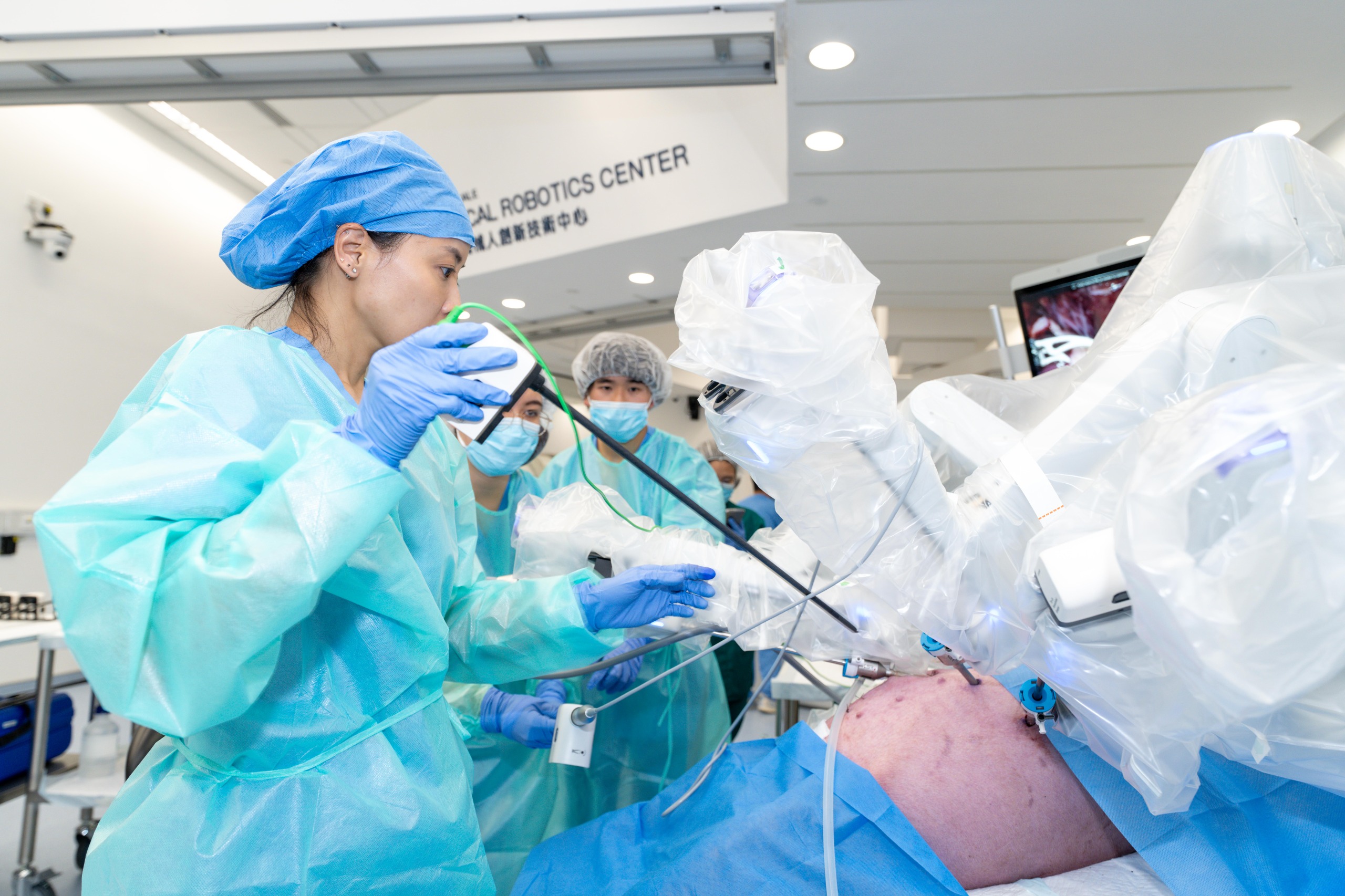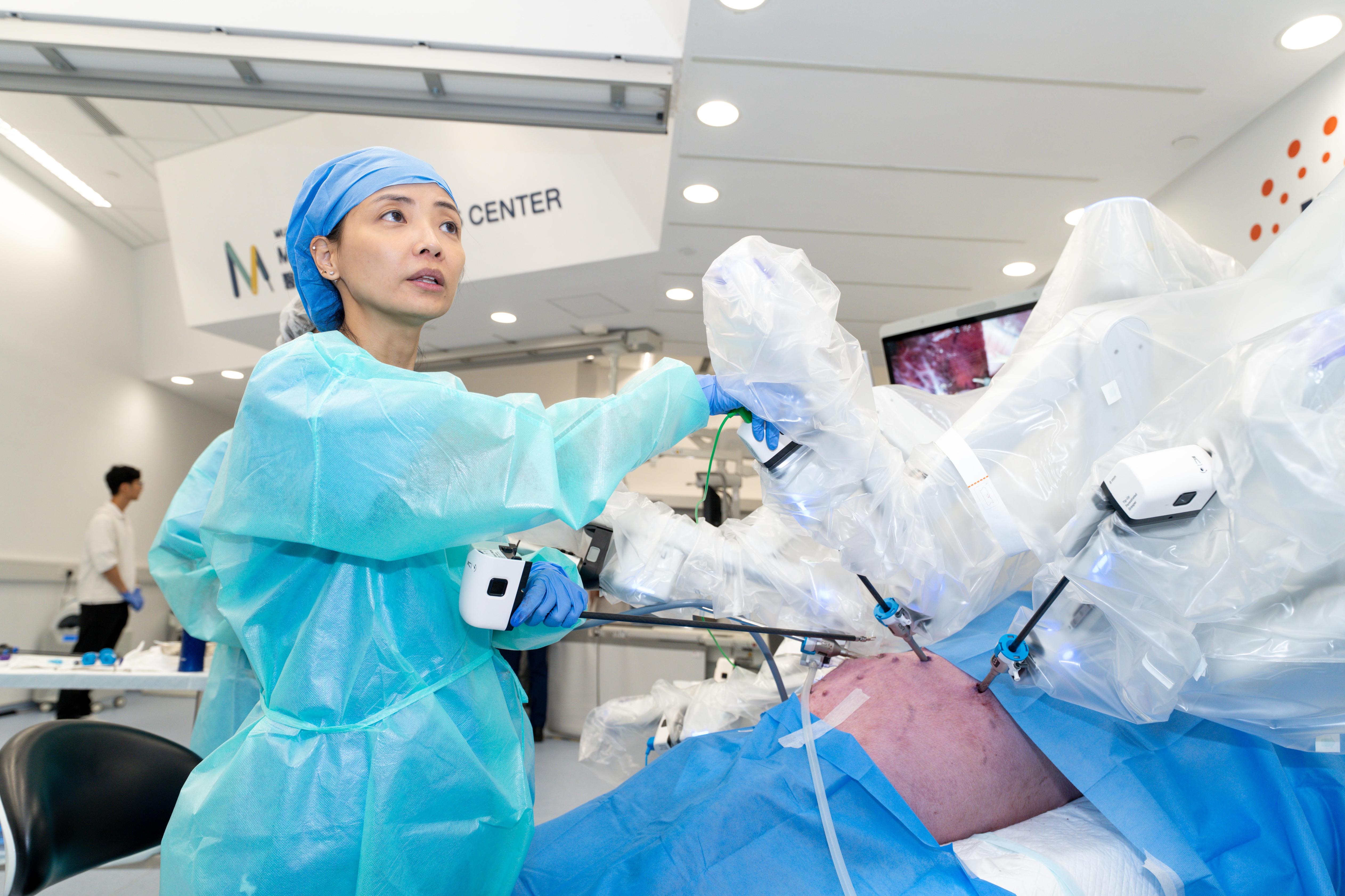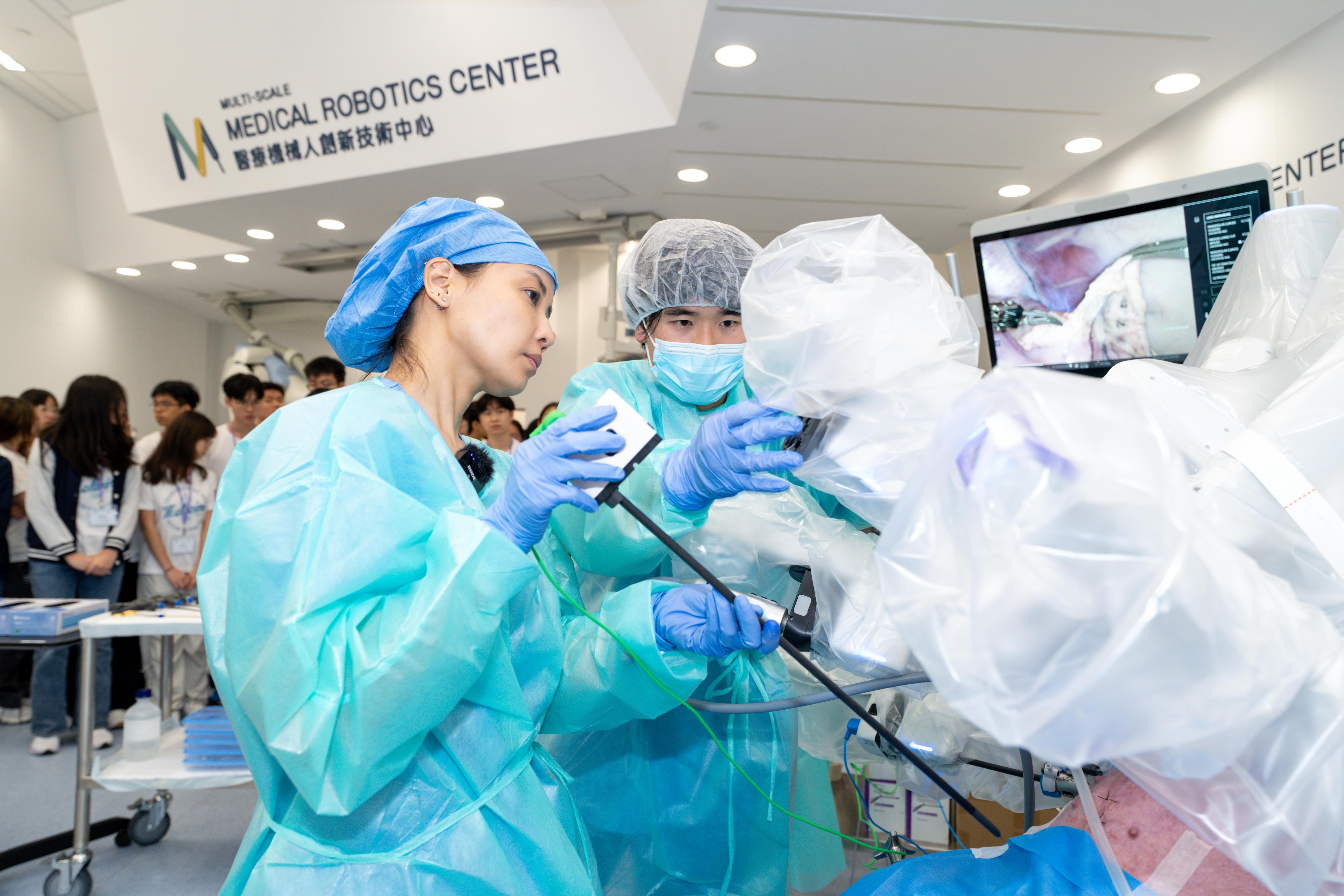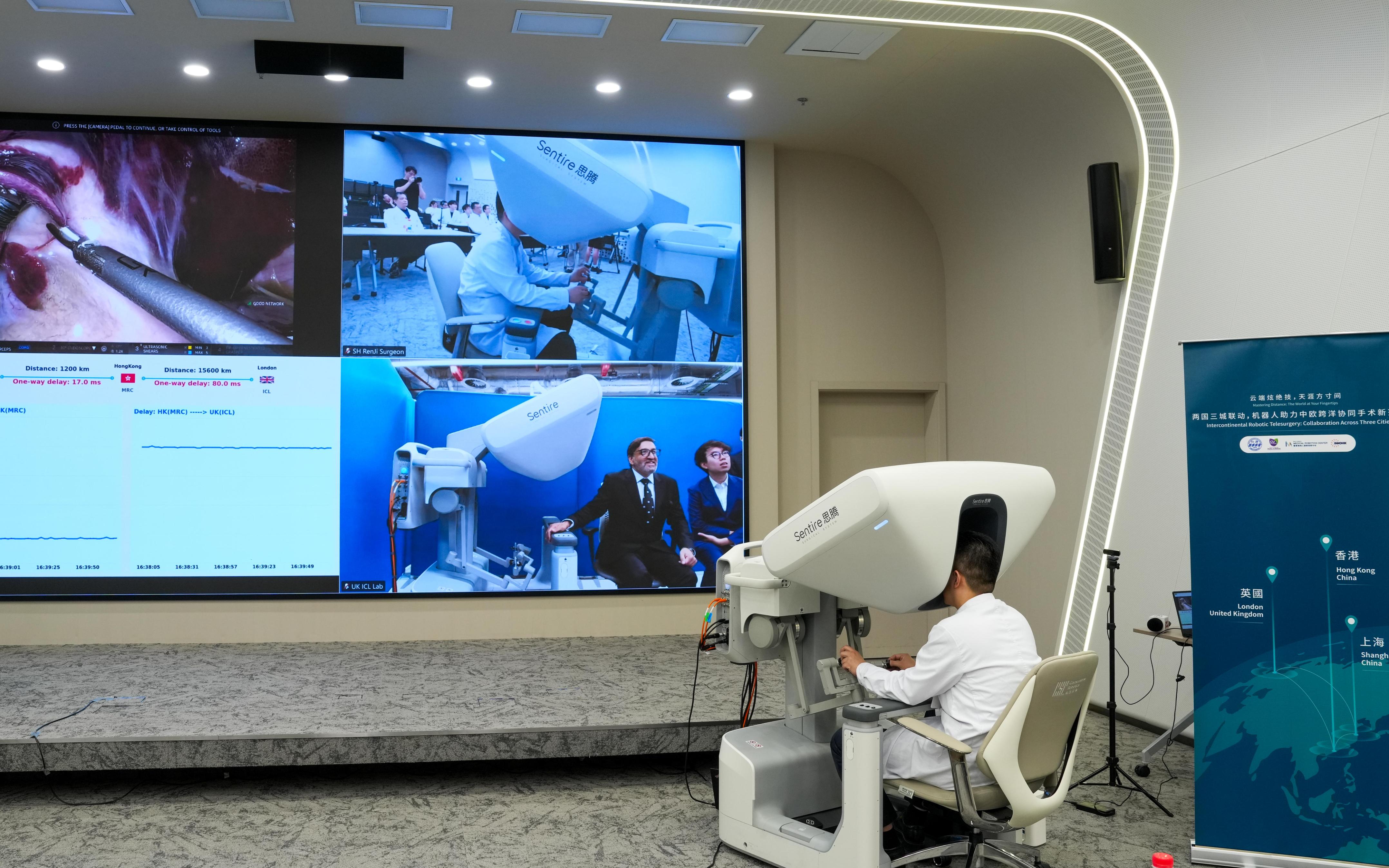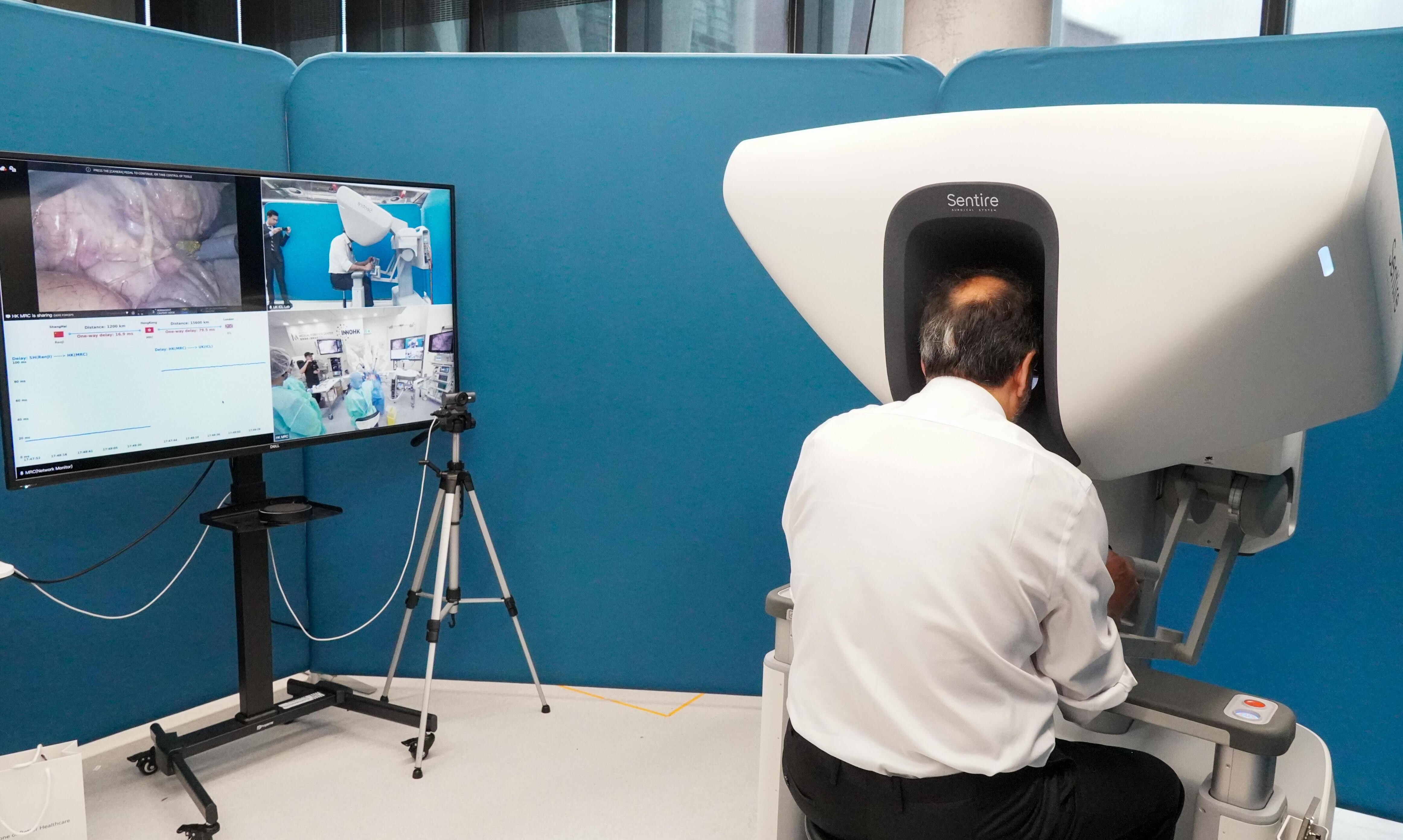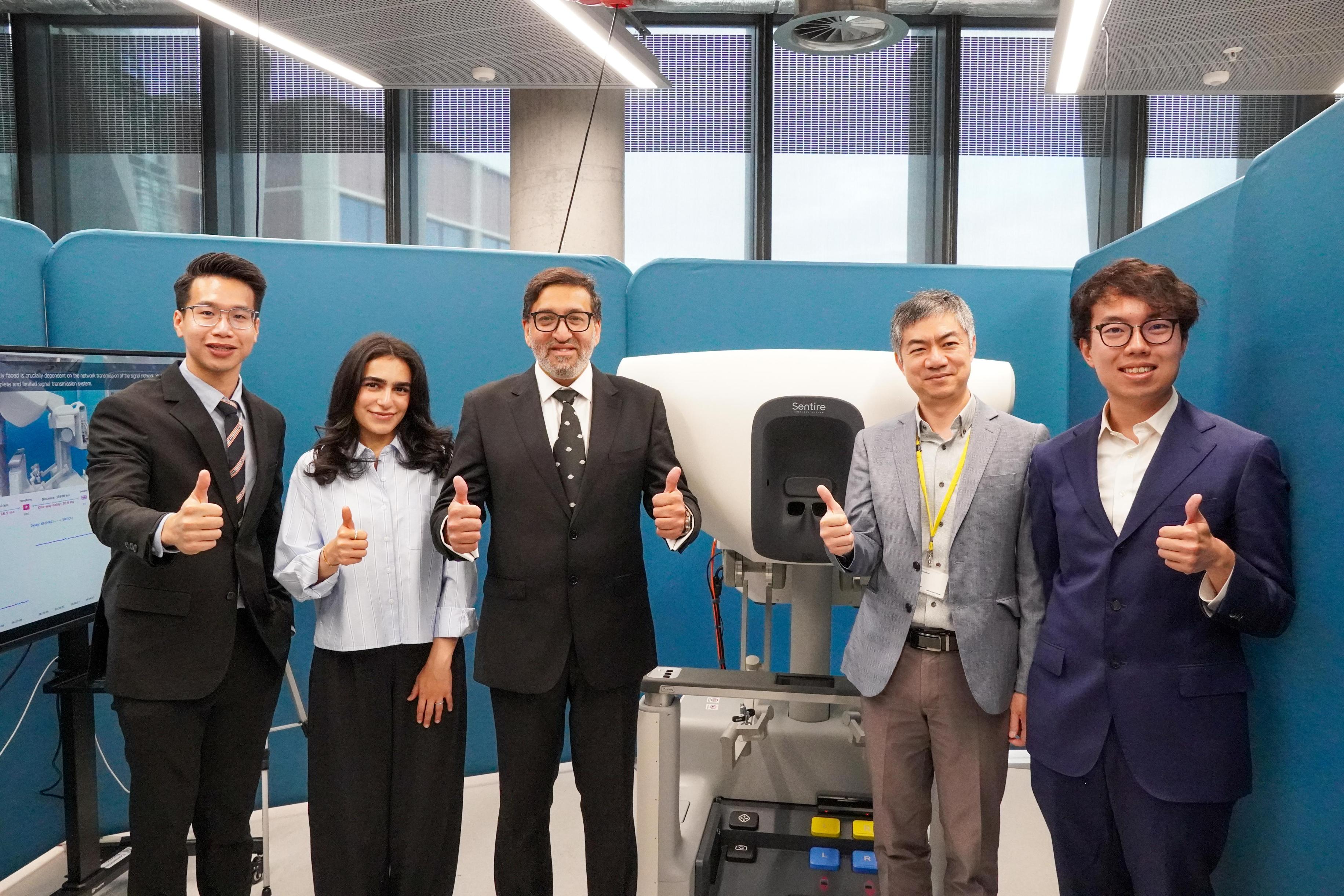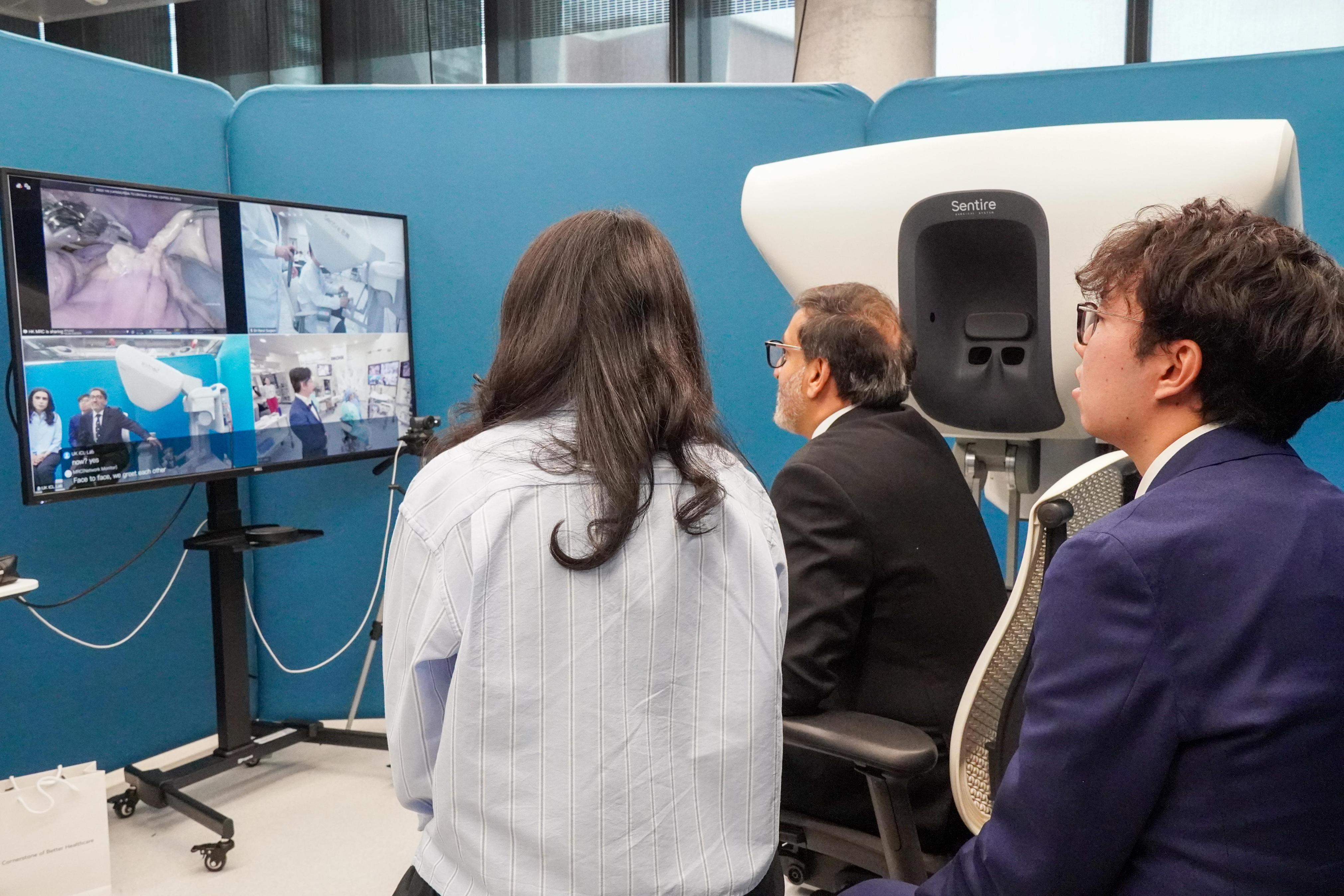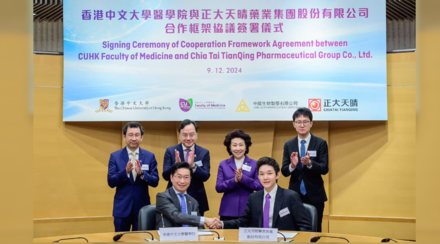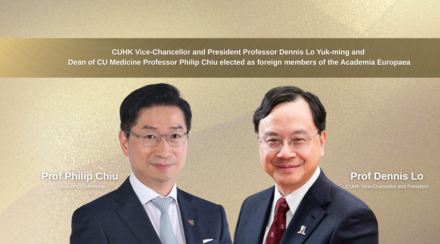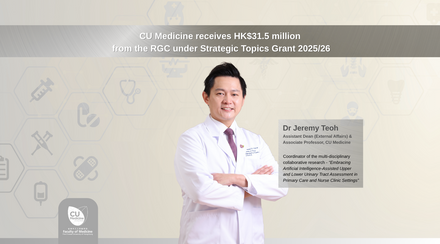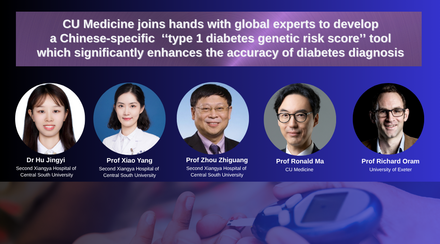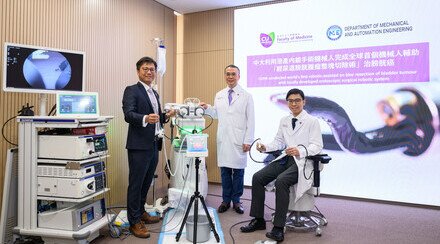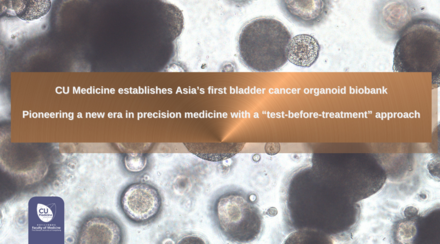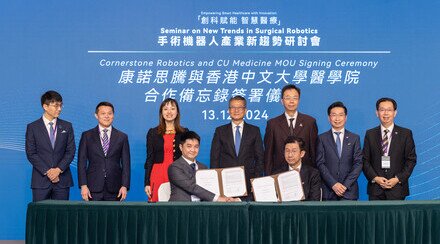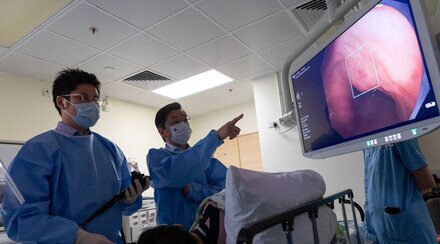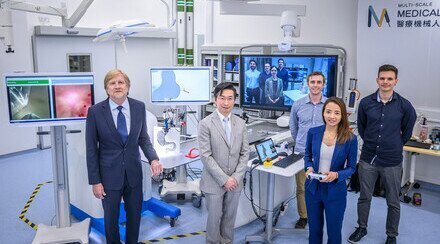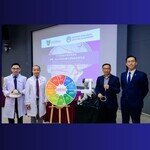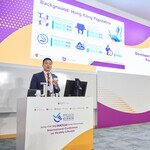▲ A group photo among (top right at the back in photo) Professor Philip Chiu Wai-yan, Dean of CU Medicine and Shun Hing Education and Charity Fund Professor of Robotic Surgery ; (top left at the back) Professor Asif Chaudry, the surgeon representing the London team; team and guests from Shanghai (from front left) Professor Samuel Au, Department of Mechanical and Automation Engineering and Co-director of The Multi-scale Medical Robotics Center (MRC) from CUHK; Professor Zheng Wang, Vice President of Renji Hospital and Professor Zhizhen Zhang, the surgeon representing Shanghai team and Executive Director of Department of Gastrointestinal Surgery from Renji Hospital.
Featured in Hong Kong include (centre in photo) Dr Shannon Melissa Chan, the surgeon representing Hong Kong, Assistant Professor in the Department of Surgery at CU Medicine; together with two assistants, both being medical students of CUHK.
The collaboration is witnessed by Professor Philip Chiu Wai-yan, who expresses his appreciation to the multi-national surgical team and shares CU Medicine’s vision of fostering collaboration and exchange among top-notch surgeons to facilitate education and knowledge transfer to younger surgeons, while offering more innovative scenarios in remote exchange and world-class surgeries for future medical talents, which will enhance healthcare quality and accessibility in Hong Kong and across Asia, and ultimately transform the global healthcare system.
A real-time tripartite surgical collaboration well-executed by top-notch surgeons across 20,000 km between Asia and Europe
The surgery brought together top surgical teams from Hong Kong, Shanghai and London. Leveraging the tele-robotic surgical platform invented in Hong Kong, surgeons in Hong Kong, Shanghai and London performed a gastrectomy and lymphadenectomy on the stomach and oesophagus taking the careful steps required for a cancer operation on a porcine model located in Hong Kong, bridging the 20,000 km distance among the three cities in Asia and Europe. The surgery proved the feasibility of multi-site and multi-national collaborative surgery using tele-robotic surgical technology, with a focus on assessing its operational stability, system reliability, and collaborative efficiency across diverse geographical and environmental settings.
The surgical team included Dr Shannon Melissa Chan, Assistant Professor in the Department of Surgery at CU Medicine; Professor Zhizhen Zhang, Executive Director of the Department of Gastrointestinal Surgery at Renji Hospital; and Professor Asif Chaudry, a leading Consultant Robotic Cancer Surgeon, operating from Imperial College London who also holds professorships and has pioneered robotic surgery in various parts of Asia and the Middle East.
▲ Featured are Dr Chan in Hong Kong, assisted by two CUHK medical students, offering real-time supervision and support throughout this telesurgery which breaks the walls across 20,000 km across three cities in Asia and Europe.
Professor Zhang from Renji Hospital kickstarts the surgery remotely.
The London team represented by Professor Chaudry proceeds with the resection process remotely.
The team from Renji Hospital kickstarted the surgery by mobilising the stomach on the porcine model in Hong Kong remotely. The London team, stationed at Imperial College London under the auspices of the joint research initiative between the Hamlyn Centre and the InnoHK Multi-Scale Medical Robotics Center (MRC) of The Chinese University of Hong Kong, then successfully performed a tele-robotic gastrectomy in the porcine model, post-mortem, whilst operating from London. The Hong Kong team provided the key surgical system platform that hosted the porcine model, while offering real-time supervision and support throughout.
The collaboration was witnessed by Professor Philip Chiu Wai-yan, Dean of CU Medicine and Shun Hing Education and Charity Fund Professor of Robotic Surgery; and Professor Zheng Wang, Vice President of Renji Hospital. Two CUHK medical students who have been actively involved in surgical robotics research participated in this multi-site telesurgery in order to gain hands-on experience. A CUHK medical graduate currently pursuing a PhD at the University of Oxford also assisted in the procedure from London. Nearly 200 local secondary school students were offered a fresh international perspective through this innovative educational model that integrates clinical training with translational research across borders. By deepening their insights into the latest advancements and applications in tele-robotic surgery, the initiative is expected to nurture new talents for Hong Kong’s medical innovation and technology sector.
Accelerating clinical application and translational efforts of telemedicine to foster exchange among the world’s top medical talents
Geographical barriers often pose a major challenge to patients in accessing timely and appropriate treatment, particularly for those from remote areas. This multi-site telesurgery demonstrates Hong Kong’s well-developed robotic surgical technology, enabling medical experts around the globe to collaborate in real time without being constrained by locations or time zones. It allows complex clinical operations to be performed with higher efficiency, precision and stability, saving patients from the trouble of transfers or long-distance travel, lowering healthcare costs, and ultimately benefiting a broader patient population.
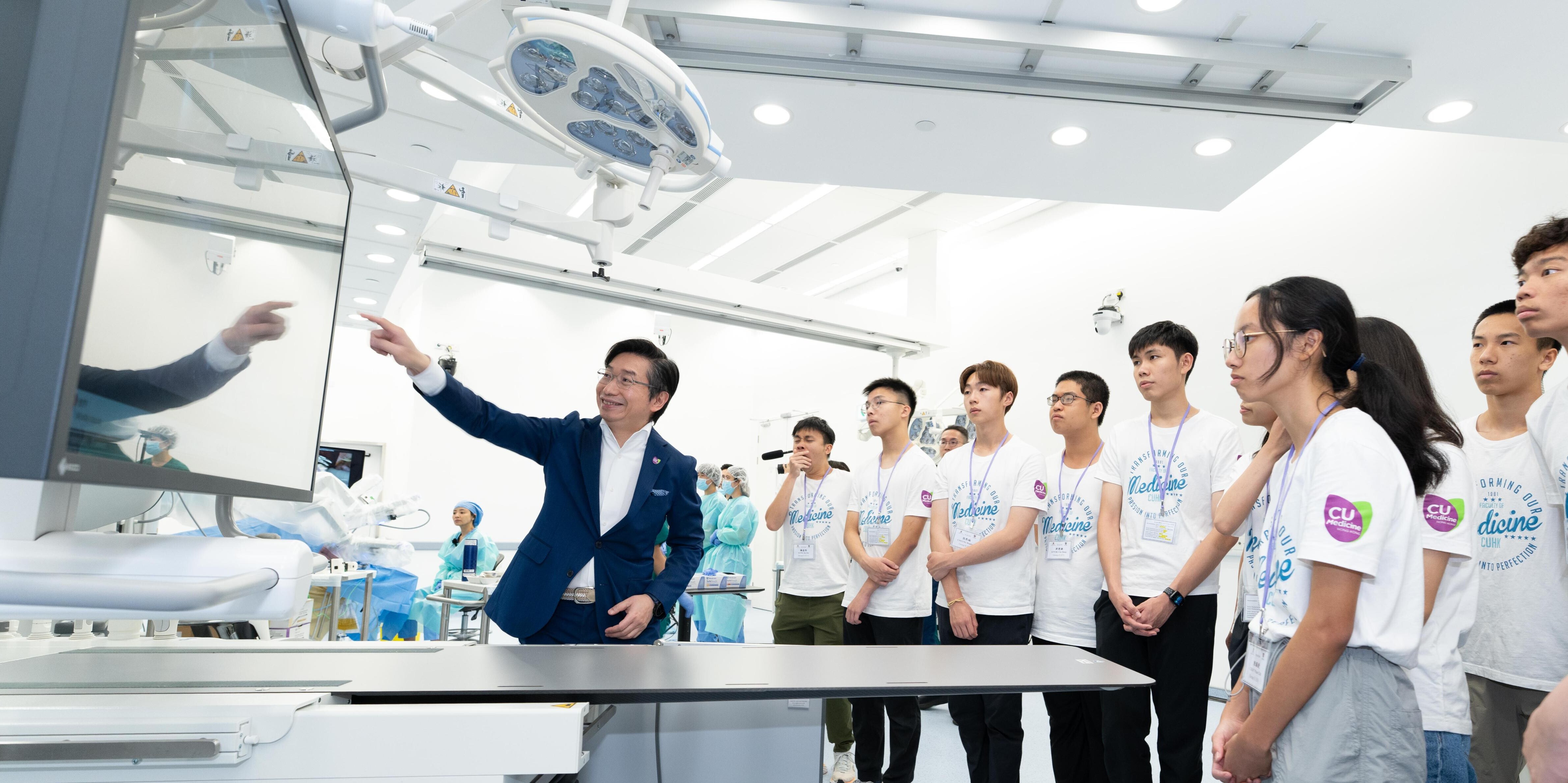
200 local secondary school students are offered a fresh international perspective through this surgery, representing an innovative educational model that integrates clinical training with translational research across borders.
Professor Chiu said: “Hong Kong is located at the heart of Asia. This tele-robotic surgery across three cities marks not only a major milestone in technological innovation and translational research but also underscores Hong Kong’s pivotal role in bridging geographical boundaries, bringing together world-renowned medical experts to deliver world-class surgical services for patients worldwide. The groundbreaking initiative showcases the vast potential for cross-regional collaboration in smart healthcare and medical education, empowering leading medical centres to enhance training and proctorship on surgical operations which will advance education and knowledge transfer for young surgeons in other centres. CU Medicine is honoured to be part of this forward-looking, tri-partite tele-surgical collaboration which is expected to be a catalyst for smart healthcare. We also aim to offer more innovative scenarios in remote exchange and world-class surgeries for future medical talents, which will enhance healthcare quality and accessibility in Hong Kong and across Asia and ultimately transform the global healthcare system.”
Professor Wang commented: “Renji Hospital has always been committed to medical innovation and international collaboration. This surgery connecting three locations in Asia and Europe aims to explore the application and prospects of surgical robotic technology in complex clinical scenarios such as multi-site collaboration and joint surgery. We look forward to taking this surgical exchange as an opportunity to work with more experts around the world, exploring new paths in telemedical technology development and collaboration, providing practical samples for the systematic development of smart healthcare in China and bringing more advanced medical services with higher quality to patients.”
Professor Chaudry said: “This collaboration with excellent international partners, both in London and Asia, proves that distance is no longer a barrier to surgical excellence. Through convergent science and digital innovation, we are reshaping the future of global cancer care. The fusion of clinical leadership, robotics, and translational research means we can now operate as a unified surgical team across borders—delivering expert, personalised cancer care to patients wherever they are. There is a huge gap in meeting the global need for safe surgery and I have no doubt that technological strides together with human friendships such as this will bring about a better future for many.”
▲ Featured is (from right) a CUHK medical graduate currently pursuing a PhD at the University of Oxford, who also assists in the procedure from London.
Acknowledgement
The work was supported by the InnoHK initiative of the Innovation and Technology Commission of the Hong Kong Special Administrative Region Government.


